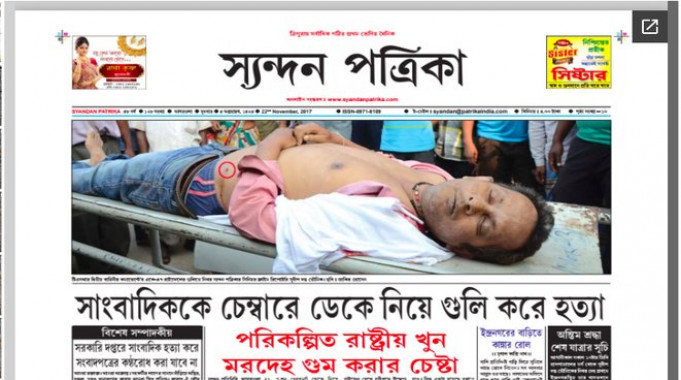TRS commandant held for murder of reporter in Tripura
The cold-blooded murder of crime reporter Sudip Datta Bhowmik in the campus of the 2nd Battalion of the Tripura State Rifles (TSR) may have been given a hurried whitewash if it wasn’t for the vigilance and persistence of local citizens and his colleagues.
Bhowmik was shot dead at around noon on Nov 21, 2017 inside the office of the TSR 2nd Battalion Commandant Tapan Debbarma at RK Nagar, Agartala. Debbarma has been arrested this morning. Earlier yesterday, Debbarma’s personal guard, Nanda Reang, was arrested after reports that he had opened fire and killed Bhowmik, following an altercation with him.
Inspector General of Police (Law and Order) K V Sreejesh told The Hoot that both have been charged with murder (Secs 302 and 109 IPC). “We will be seeking police remand for both of them,” he said.
Sudip Bhowmik was 49 years old and is survived by his wife, a school teacher, and two children. He had been working as a crime reporter for ‘Syandan Patrika’ for the last four years. Barely two months ago, television journalist Shantanu Bhowmik was brutally hacked by members of the Indigenous People’s Front of Tripura (IPFT) when he had gone to cover a clash between supporters of the IPFT and the Communist Party of India-Marxist (CPI-M).
Sudip Bhowmik had written a number of stories on the corruption charges against Debbarma between October and November this year, the last one appearing on November 13, said his editor Subal Kumar Dey. Debbarma had invited Bhowmik to come to his office to discuss the stories and he had informed Dey that he was going to meet him.
But journalists and locals who have tried to piece together the information leading to the killing, have another account of the crime. They told The Hoot that the news of the killing only filtered out of the campus thanks to an alert autorickshaw driver who had dropped off a customer and overheard sentry guards talking about some shooting.
The ‘rumour’ that something had happened inside the campus spread quickly and reached the ears of Bhowmik’s colleague Tipu Sultan, who came to the campus and saw Bhowmik’s motorcycle parked outside. He immediately called the office and other colleagues and journalists gathered there.
In the meantime, in what could be the most horrendous attempt to cover up the crime, Bhowmik’s body had been brought by four TSR personnel to the Agartala Government Hospital at 2.15pm., two hours and fifteen minutes after he was shot dead. Doctors on duty demanded more information as to how he sustained his bullet injuries but got nothing out of the personnel and then called police. Sultan identified his body.
“We don’t really know what happened inside the campus. But from our information, Bhowmik had gone to meet the Commandant inside his office. The guards outside heard an altercation and heard gunshots. Reang went inside and the Commandant gave him the order to shoot Bhowmik but he may have refused or not immediately obeyed,” said Biswendu Bhattacharjee, a correspondent with Times of India in Agartala.
There are conflicting versions of what happened. Bhattacharjee said that Reang went outside the office but left his rifle behind, and heard another sound of gun-shots. Bhowmik’s body was dragged out around 50 metres from the Commandant’s office. No one knows why it took over two hours for the body to be moved to the hospital. Perhaps there were some attempts to wash their hands off it and dump it somewhere, Bhattacharjee surmised.
Sudip Bhowmik was a senior journalist and had worked in other publications, including Dainik Sambad, where his brother, Pradip Datta Bhowmik is news editor. Journalists’ organisations in Tripura have demanded a CBI investigation into his killing and a compensation of Rs one crore to his family, besides financial support from the government to his children for their education.
Journalists’ organisations in Tripura have demanded that Chief Minister Manik Sarkar give up additional charge of the Home Ministry portfolio as it has completely failed to tackle the law and order situation in the state. They say that the TSR, an elite force that was set up to combat insurgency, is ridden with corruption, and has become a law onto itself.








